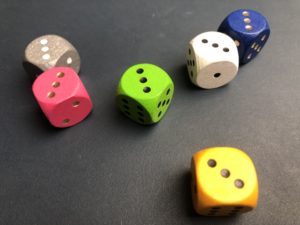
Solo Gaming
October 28, 2020 by Sam
2020 has been a strange and depressing year in so many ways, it’s hard to get your head around it all. One of the admittedly less-dramatic impacts has been on the idea of social board-gaming. Although there are bigger fish to fry for most of us, a key part of mental health is social interaction, and as amazing as modern communications are, they’re no substitute for interactive, tactile experience being in the same room together, sharing the same experience.
We’ve no solution for that, unfortunately, but for a gaming fix that doesn’t rely on your laptop, there are many games released in the last few years that cater for solo play, along with a few specifically designed for the single player. I used to be a little snobby about solo gaming – it seemed to run counter to the entire purpose for me – but then, as I watched my child playing online solo, I realised that there’s little to no difference between those two experiences: in fact, I prefer the latter. Having had ample opportunity to play solo over these last few difficult months, I thought it was worth noting the games that stood out for me in this regard. This is only a few though! And there are many more that are no doubt equally worthy of attention. For a more encyclopaedic take, go to the games page and filter your search by looking for games with Number of players: 1

-
Let’s start with a bit of a crowbar: Nemo’s War was not new to me in 2020, but it’s worthy of inclusion. Although it offers a co-operative mode for more than one, it’s predominantly a solo undertaking, seeing you tread a path – erratically – through the adventures of the titular captain, choosing whether to push his personality towards adventurous, scientific, anti-imperialist or warlike. Whichever ‘Nemo’ you choose informs the decisions you make in the game, although you’re always reasonably warlike – if such an oxymoron can exist – as the game sees the oceans filing up with ships, and part of Nemo’s character drive is to keep people, troublesome people, away from the sea. Part story, part luck-pushing dice-chucker, it looks a real brain-burner at first (most of the rules are on the board itself!) Nemo is less a murky head-scratching undertaking than a slightly crazed descent into one man’s lunacy – via dice.
-
It can be played solo, with two, or up to five, but like Nemo’s War The Lost Expedition feels like it was designed for solo play. Whereas Nemo will occupy you for at least 90 minutes, the expedition feels aptly named – it may not take long to lose. Beautifully illustrated with Herge-like drawings, each play is a puzzle that asks you to reach the city of El Dorado with at least one of your adventurers (you start with three) still breathing. And it’s not easy, with all manner of threats coming your way from every angle. Disappointingly, even the most daring avoidance tactics won’t save you if you reach the end of the day and have no food…
-
Like The Lost Expedition, the main thrust in Friday is survival. Taking a more overtly comedic approach, you play Friday, doing all you can to save the bumbling Robinson Crusoe from himself as he clatters around the island disturbing tigers and failing to attract the attention of passing ships. Despite Crusoe’s obvious shortcomings, you can’t help but root for him as time, food, and prospects run out. A game to stymie you, fox you, and most-likely condemn you to end Crusoe’s (short-lived) days on the island. And all in 20 minutes!
-
A very different vibe with Wingspan, which is our first truly-multiplayer game that also offers a decent solo option. Just as with the social version, here you are constructing your nature reserve and attracting a wide variety of birds. Wingspan’s ‘automa’ creates an AI style rival who – with suitably robotic efficiency – seems destined to outscore you. But repeat plays will help you create the synergy needed in the cards to outplay the automa. It doesn’t have the narrative escalation and latent tension that the three games above do; but then it’s not trying to be that kind of game. Wingspan is a gentler, more leisurely undertaking, and the beautiful illustrations feel aptly judged.
-
We can’t really have a list of solo games without including a war game. They’re not a common feature of GNG but if both Joe and I shy away from the lengthy playtime and heavy rulesets these games often feature, we are also both drawn to the fact they’re influenced by, and often designed to re-imagine, particular aspects of history – Twilight Struggle being just one brilliant example. In Magnificent Style retells a preposterously optimistic attack by Confederate forces at a critical juncture in the American civil war. Your goal is to lead the confederates to a far-fetched victory. If, like me, you find yourself siding with history on this particular conflict of ideals, worry not: In Magnificent Style isn’t wondering if only, it’s simply turning a coldly clinical eye on the madness of the battle itself and the wholly unlikely dreams of desperate men.
-
If 30 minutes shuffling or dice-rolling doesn’t sound like it’ll sate you, then how about leading a hoard of farming, trading, raiding vikings through six or seven rounds of cultural growth, gathering your achievements in the form of tetronimo pieces: the more of your board you fill in with said pieces, the better your progress and final score. There’s no-one to beat other than yourself (the challenge is to get the highest score you can) and no war-game style narrative of real-world events playing out. It’s kinda bonkers, in fact, but the satisfaction you get of gathering disparate parts into a functioning whole – the sense of achievement resonates with engineering, rather than vikinginess – will fill up the room. As will all the stuff in the box.
-
Twice as Clever (and its predecessor Very Clever) has a multiplayer mode but suits solo play. No narrative, no theme, but no fun? Well, it depends on your tastes. What both games have is a very moreish flavour, inviting you to roll dice and tick off boxes. But different dice fill different boxes in different ways, and certain boxes trigger bonuses which fill other boxes. In a game of six rounds (solo; less with more people) you’re going to fill more boxes, get more bonuses, and feel the rat-a-tat-tat of minor dopamine hits as you attempt to fill as much of your pad as you can. It’s an ingeniously designed puzzle that I’ve played over 30 times (each attempt only takes ten minutes) and will undoubtedly leave you cursing both the dice and your own decision-making. (Be aware that both games are often found under their German titles (with English rules) Ganz Schon Clever and Doppelt So Clever – a third game in the series (Clever Hoch Drei) is released this year)
-
The Search for Planet X is no doubt best experienced multi-player: there’s a drip-drip of information from all players that help you – and you alone, you hope – find where the titular planet resides in the cosmos. But I’ve also enjoyed it solo. The app makes every game different and has a bespoke solo option (currently in beta as I write, but accessible). This is a deduction game that feels thematic rather than mechanical, and while the solo game doesn’t have the same race-like tension that real-life opponents provide, it’s still a very satisfying puzzle, cleverly constructed and brilliantly executed.
-
A little out of left-field perhaps – in what other civilisation-building game can you count Elvis Presley as an advisor? – but Historia’s slightly crazy spreadsheet appearance belies an accessible, fast-moving game with a really neat solo option – add as many ‘bots’ as you want to play against. Thematic? Kinda. There’s a map, but Historia is less interested in borders than it is advancements, pushing your fledgling civilisation from it’s fire-and-wheel beginnings on to medicine, the internet, and space travel. Part story, part puzzle, all curio. I like it a lot.
-
There’s something impressive about getting such a big play experience from such a tiny box. No more than a little deck of cards, Sprawlopolis is a ten-minute puzzle where the way you construct your town defines your success. But the criteria for success change from game to game, meaning there are literally hundreds of variations in scoring – and that’s before you get to the randomness in the card draws themselves. Very much suited to the single player, this is a little gem that gives you an itch you may want to keep scratching.

Sam likes games. He buys a lot of games, plays a lot of games, and likes talking about games too. Occasionally he dreams about games. Despite this, he is a happily married individual with reasonably well-adjusted children, who roll their eyes at him on a pretty frequent basis.
But they still play the odd game, so it's ok.
Sam's favourite games are a constantly shifting thing that he'd find hard to define, although he's not mad keen on orcs, miniatures, or heavy sets of rules with endless exceptions and special circumstances. He plays the occasional solo game, but feels a big part of board-gaming's appeal is the gathering of friends around a table, interacting with a tangible, physical thing.
